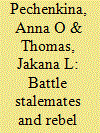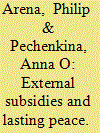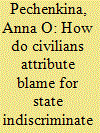| Srl | Item |
| 1 |
ID:
171221


|
|
|
|
|
| Summary/Abstract |
This manuscript examines how battlefield events influence belligerents’ pursuit of negotiated settlements in civil wars. We argue that successive stalemates are most likely to precipitate rebel demands for negotiations because they offer groups both the opportunity and willingness to push for a compromise settlement. Unlike rebel losses, stalemated battles demonstrate that rebels can offer military resistance to the state. Yet, unlike rebel battle gains, draws do not raise the prospects of a rebel war victory. Using monthly data on rebel demands for negotiations and battle outcomes for 63 African dyads fighting between 1997 and 2010, we find support for this argument; more battlefield stalemates decrease the time until a proposal to negotiate by rebels. Additionally, we examine whether the same battlefield dynamics explain the onset of formal negotiations. The results reveal only a relationship between rebel battle gains and the onset of talks. The contrast in these findings suggests that rebels and governments may conceive of battlefield outcomes, especially stalemates, differently. Although rebels perceive a window of opportunity from a battlefield deadlock, governments appear to be influenced most by rebel gains.
|
|
|
|
|
|
|
|
|
|
|
|
|
|
|
|
| 2 |
ID:
148324


|
|
|
|
|
| Summary/Abstract |
Third parties are thought to face a trade-off in that those actions most likely to bring peace in the short run appear least likely to ensure its long-run stability. Yet the trade-off between conflict management and conflict resolution may be overstated. Analyzing an iterated three-player bargaining model with both information and commitment problems, we first demonstrate two conditions under which third parties may produce lasting peace through conditional subsidies, even without addressing underlying informational or commitment problems. Second, we illustrate this possibility by analyzing the impact of US foreign aid on patterns of conflict and peace between Israel and her neighbors. Our analysis indicates that the termination of the rivalry between Israel and Egypt was most likely not brought about by the Camp David accords or peacekeeping operations, but by sustained foreign aid provision. We discuss the implications for both this conflict and conflict management more broadly.
|
|
|
|
|
|
|
|
|
|
|
|
|
|
|
|
| 3 |
ID:
167281


|
|
|
|
|
| Summary/Abstract |
State indiscriminate violence against civilians has been viewed as counterproductive for the government. This conclusion hinges on the assumption that indiscriminate violence aggrieves civilians against the government even when the rebels provoke the state by using civilians as human shields. An alternative view suggests that civilians recognize if the rebels exploit them as human shields and blame the rebels if such provocation occurs. We ask: do civilians evaluate all state indiscriminate violence in the same way or do they think of state indiscriminate violence differently when it is provoked by insurgents? Accounting for the covariate differences between individuals with and without personal experience of warfare in the survey data from postwar Ukraine, we find that personal exposure to violence shapes one’s blame attribution for provoked state attacks on civilians. Individuals unexposed to violence tend to take into account whether the government was provoked by the rebels. By contrast, individuals with personal experience of warfare tend to blame the government for indiscriminate attacks regardless of rebel provocation. This finding has implications for counterinsurgency scholarship and policy. It is likely that the difference between unexposed and exposed to violence civilians emerges in geographically isolated conflicts. If so, targeting of civilians may have different effects on the escalation of insurgency in geographically concentrated as opposed to widespread cases of violence.
|
|
|
|
|
|
|
|
|
|
|
|
|
|
|
|
| 4 |
ID:
162255


|
|
|
|
|
| Summary/Abstract |
Scholars of conflict often rely on fieldwork to study behaviours of civilians and combatants on the ground. A list experiment is a potentially useful tool for conflict scholars, as this survey methodology is designed to indirectly obtain truthful self-reports of behaviours while preserving the respondents’ anonymity. Acknowledging its advantages, this article also reviews the often overlooked shortcomings of list experiments as a survey method in conflict zones, including those limitations that cannot be corrected with better design or implementation. As an illustration, we discuss the list experiment employed to measure civilian assistance to the insurgents in the Donbas War.
|
|
|
|
|
|
|
|
|
|
|
|
|
|
|
|
| 5 |
ID:
188028


|
|
|
|
|
| Summary/Abstract |
Electoral politics and violent civil conflict often coexist. Citizens exposed and unexposed to violence bear the costs of conflict unevenly and, thus, conceive of militant vs. accommodationist state response to the perpetrators of violence differently. The literature has found that victims of political violence tend to endorse militant state response against nonstate actors seen as responsible. This result is mostly based on secessionist conflicts in which victims of violence are often shielded from the costs of state counterinsurgency or counterterrorism campaigns. By contrast, we argue, in non-secessionist conflicts, individuals exposed to violence tend to also experience the state militant anti-guerrilla operations, which often lead to state abuses of civilians. We expect that civilians exposed to nonstate and state attacks will be more likely to support pro-peace policies. We find support for this argument analyzing Colombia’s 2014 presidential election and 2016 peace agreement referendum. In addition, we use original data on local candidates’ pro- and anti-peace process positions in Colombia’s 2014 congressional election to test the underlying logic of the argument that local communities exposed to both nonstate and state violence are more likely to demand pro-peace policies.
|
|
|
|
|
|
|
|
|
|
|
|
|
|
|
|